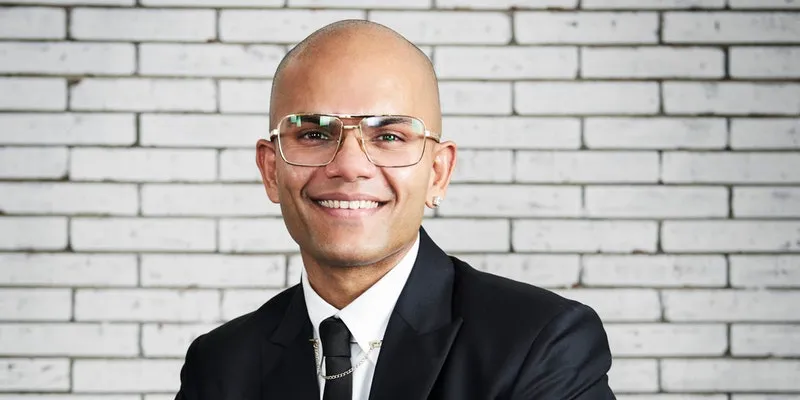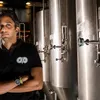Here's how a liquor seller built a Rs 1,360 Cr turnover alcohol business
Registered in 1996 in Delhi, NV Group was started by Ashok Jain. His son Varun Jain, who joined the business to head marketing and business development, narrates the business' journey and explains its functioning.
In the early 1990s, Ashok Jain was a liquor seller in a small wine shop in Haryana. Though he was just selling liquor, he had big visions to be a retailer of alcoholic beverages.
Going confidently in the direction of his dreams, over the years, he and his friend saved up some money to buy the same shop he worked in. And, as the demand for alcoholic beverages rose, their sales grew and they made enough money to buy a few more stores. Later, Ashok also became a partner at Gurgaon Liquor Syndicate.
Over time, Ashok became a wholesaler of alcoholic beverages, then a bottler, and then a distiller. By 1996, Ashok was at the helm of his own liquor business: NV Group.
In an interaction with SMBStory, Ashok's son Varun Jain, who joined the family business and is now Director for marketing and business development says,
"Everyone has their own dream. My father's dream was to have his own liquor warehouse. Once he had a warehouse, his dream grew to have his own bottling unit for alcohol made by other companies. From there, the dream grew again, and this time, it was about making alcohol and bottling it."

Varun Jain, Director, Marketing and BD, NV Group
He recounts how the domestic market for alcohol was growing when NV Group was first started. "At that time, Black Label was a big deal. It was a whiskey market. As it started to grow, white spirits and Bacardi entered the picture," he adds.
Ashok had a solid business plan in place when he started bottling, Varun says, adding:
"The plan mattered the most because state policies and import-export taxes were different everywhere. Further, getting good people on board was a challenge. Just because the founder is good at what he/she does, success is not guaranteed and cannot be achieved alone."
Today, 23 years down the line, NV Group claims a turnover of Rs 1,360 crores for the last financial year, and sales of approximately Rs 120 crore per month. It has around 500 employees on payroll.
NV Group's success is telling of the rising demand for alcoholic beverages in the country. India's large young population base, rising disposable income, and urbanisation of Tier 2 and Tier 3 cities is fuelling the demand and contributing to the growth. Changes in attitude and lifestyle have also made alcohol consumption more acceptable.
Based on these growth factors, the alcoholic beverages market in India is expected to grow at a CAGR of 7.4 percent between 2016 and 2024 and reach $39.7 billion, according to Goldstein Research.
To cater to the market, NV Group makes its own whiskey under the brands Party Special, Royal Envy, and Discovery. Its range of vodka and gin is named Blue Moon, and its rum Crazy Romeo.
It also produces liquor for Pernod Ricard, Bacardi Martini, and Diageo. It has four distilleries (two in Haryana and one each in Punjab and Maharashtra), a bottling plant in Goa and Chandigarh. Setting up these distilleries on time was a challenge, Varun recalls.

NV Group's largest distillery in Punjab
"In Maharashtra, we don't manufacture our own products. In Haryana, we have given space for Pernod Ricard to make Royal Stag and Blenders Pride," Varun says.
The liquor made in manufacturing units in Punjab and Haryana is grain-based. NV Group has sourced multiple suppliers at each step along the way, such as vendors for bottles, caps, packaging, etc, Varun claims.
Products and pricing
NV Group tries to cater to all market segments. Varun says, "Companies in our line of business have products for multiple segments. The more segments you address, the more volume you create for yourself, and your capacity increases. There is a segment for Rs 200 bottles, Rs 400 bottles, Rs 800 bottles, Rs 1000 bottles, and so on. We try to maintain high quality in all these segments."
Naturally, NV Group's products are priced based on which segment they cater to. Varun says that when his father first started selling, he observed what products were selling well in the market and how high quality they were. Accordingly, he devised his strategy for pricing products in a similar range- a process NV Group follows to this day.
"Once we got into the cheaper, mass product range, our backend had to support production. Some companies go bust in competing in this segment," Varun says.

NV Group's Smoke vodka
Margins are small in the mass segment, where the fight between brands is largely for market share and not profits. "Selling Rs 200 bottles is a volume-based game and we look at number of cases sold and future valuations," he says.
Premium products allow for higher margins, but don't sell as much. "They also have to have higher quality and more expensive packaging," he adds.
State policies play a role in determining the price a consumer pays when buying a bottle. Varun uses the example of NV Group's new vodka offering, Smoke, to explain:
"In Delhi, the classic Smoke costs Rs 2000 and the aniseed variation costs Rs 2,500. It will be launched in Maharashtra soon, where the pricing will be drastically different. It will be almost double. It is the same for the whole industry," he says, adding:
"Bacardi's Grey Goose vodka costs Rs 3,800 in Delhi and Smoke costs between Rs 2000 and Rs 2500. In Mumbai, Grey Goose costs Rs 5800 and Smoke will cost Rs 4000."
To make whiskey, the company imports scotch from Scotland and blends it, and this adds to the cost.
"Single malt is a lengthy process. Right now, we have blended whiskeys. In the future, we want to get into single malts, like what Amrut and Paul John have done. We will get there in another year or two as the minimum maturity for single malt in three years," he explains.
To do away with differences in prices between states, he adds that a single policy for all states is ideal, but he believes it won't happen.
However, differences in legal drinking ages between states are not of much concern to him. "Even considering a case like Delhi where the legal age is 25, there is enough population over that age, and hence, the volume of sales never goes down. As an industry, we haven't suffered a volume drop because of drinking age limits," he says.
Distribution and publicity
NV Group has a robust distribution setup in Delhi and retails products from multiple brands. In Haryana, the company incentivises a promoter to distribute its alcoholic beverages. NV Group follows the same approach in Punjab, Himachal Pradesh, and Uttarakhand.
"In some states, it's better to tie up with a local bottler to make and sell. This will help save import taxes. We have such tie-ups coming soon," he says.
NV Group's Rajasthan network, however, faced challenges when the company invested too much into operations. It had to be shut down, Varun says, adding that the company learned the lesson that it is better to be strategically-focussed and incentivise promoters in states rather than investing heavily in distribution.
NV Group may expand into Kerala and Karnataka by April, basis how talks go with local promoters.

Inside NV Group's Punjab unit
Its ventures into new states are backed by its promotional campaigns to familiarise people with the brand. Alcohol cannot be advertised and brands have long relied on surrogate advertising, but NV Group is taking a different approach.
Varun says the company ties up with tour guides to publicise Discovery whiskey, makes Royal Envy playing cards, Smoke fashion, and will soon sell canned water under the Smoke brand.
"This year, we truly got into digital media marketing. For publicising things around whiskey products, I feel Facebook works better as tier 2 and tier 3 cities are more Facebook-driven. For Smoke vodka, the target is the younger generation, which is more active on Instagram," he says.
Going forward, the group is keeping a close eye on the competition. This will help in doing things differently and getting noticed by consumers, he says.
The group has lined up investments worth Rs 300 crore in the next year to expand production and distribution. Presently, it exports to the UAE and Oman, and it wants to explore entering the USA, Europe, China, and more. It also intends to manufacture liquor abroad.
(Edited by: Palak Agarwal)









